Great Warren Beatty quote: “Marriage requires a special talent, like acting. Monogamy requires genius.”
Is Luca’s “After The Hunt” Cannes-Bound?
In a story posted three hours ago, La Parisien‘s Renaud Baronian reported that Luca Guadagnino‘s After The Hunt may be headed for Cannes. But who knows?
If true and if the film plays as well as it most of it reads, Julia Roberts will probably emerge as a hot contender for the festival’s Best Actress prize. Maybe. Where’s the harm in generating a little optimism?
Who the hell is Renaud Baronian, right?
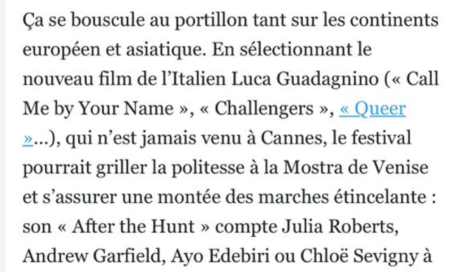
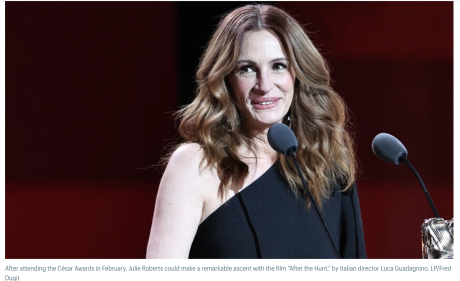
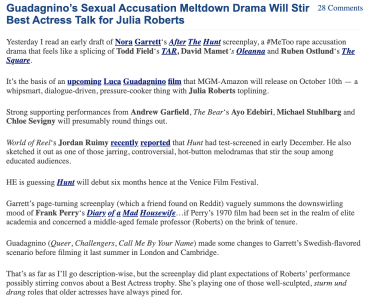
Galloway: “We Are Literally Evolving A New Breed of Asexual, Asocial Males”
The culture has been telling smart, ambitious women to walk away when this or that dude has an issue or two…”you don’t need the imperfect man”…get shut of him, shut him out.
The culture isn’t wrong.
I was batting around .300 or .350 between my early 20s and late 30s, and even then my general feeling was on the downish side…that things weren’t really working out and that there wasn’t much hope for the future, relationship-wise. I can’t imagine what it must be like for homely guys with tennis-ball hair and lumpy bods to be striking out time and again, over and over. But that’s the reality out there. I don’t blame women a bit for being choosy.
@diaryofaceoclip Scott Galloway explains why men are feeling rejected and lonely #lonely #men #relationship #dating #tinder #datingadviceformen #love #lovestory #partner ♬ original sound – Diary Of A CEO Clips
Film Noir Is Always Fun To Riff On
Bill Maher’s Club Random with Maureen Dowd (posted on 3.30) is a pretty good one. They start talking about their favorite films around the 44:00 mark: Breakfast at Tiffany’s, Double Indemnity, Saving Private Ryan, Body Heat, Shakespeare in Love, etc.
Lusty, sexualized, infidelity-driven film noir “is my favorite genre,” Dowd says.
And then, at 46:03, she says that her all-time favorite in this realm is Jacques Tourneur‘s Out Of The Past (’47)…”you gotta watch it…Robert Mitchum, Kirk Douglas, Jane Greer…it’s the perfect film noir.” And Maher says, “Oh…never heard of it. Out of the Past?”
Lord knows there are several good films I haven’t seen and perhaps others I haven’t heard of, but good heavens. It’s one thing if you haven’t seen one of the most revered film noirs of all time, but to have never heard of it? Okay, man…some of us roll in different ways.
Dowd mentions that funny Body Heat scene in which Ted Danson‘s district attorney, who’s friendly with Bill Hurt‘s Ned Racine, reports that a little girl who had come upon Kathleen Turner‘s Matty Walker in a sexual situation…he reports that the girl drew a blank when it came to describing the facial features of the guy Walker was with, recalling only that he was short and bald. Danson: “I guess she’d never seen one angry before,”
Dowd converses like an everyday, unpretentious, water-cooler colleague…a very smart one. I listened to her speak inside L.A.’s Skirball Center 15 or 20 years ago. She and Alessandra Stanley were alternating on the mike.

NEW: Bill Maher, Maureen Dowd say Dems' woke era isn't over
DOWD: "[Dems] just stopped being any fun. They made everyone feel that everything they said and did, and every word, was wrong. And people don't want to live like that."
MAHER: "No. Do you think we're over that… pic.twitter.com/4DKEqYZXDE
— Jason Cohen (@JasonJournoDC) March 30, 2025
Why Wouldn’t “F1” Debut in Cannes Six Weeks Hence?
It doesn’t make basic sense that Joseph Kosinski ‘s F1 (Warner Bros./Apple), opening worldwide on 6.25, isn’t debuting in Cannes in mid-May.**
Because it apparently won’t be.Even with Mission: Impossible — The Final Reckoning (Paramount, 5.25) allegedly locked down for a Côte d’Azur premiere, F1 is the hotter, louder ticket. We’re all familiar with the M:I brand…same old bing-bang-boom. Not to mention the eternally stationary Ving Rhames again.
Is there some kind of ironclad rule that within a given Cannes Film Festival there can only be one U.S.-produced blockbuster? Did Paramount and Tom Cruise insist on a no-competition clause or something?
Jordan Ruimy was told a while back that F1 producers “opted instead for a world premiere in Monaco.” Because of the annual Grand Prix, of course. The only problem is that Monaco is a really shitty place for a world premiere. It’s an architecturally ugly, super-corporate city (I was repelled during my last visit) and it attracts the worst (i.e., shallowest) people in the world.
** Patrick Brzeski and Scott Roxborough’s THR prediction piece is two weeks old, granted.
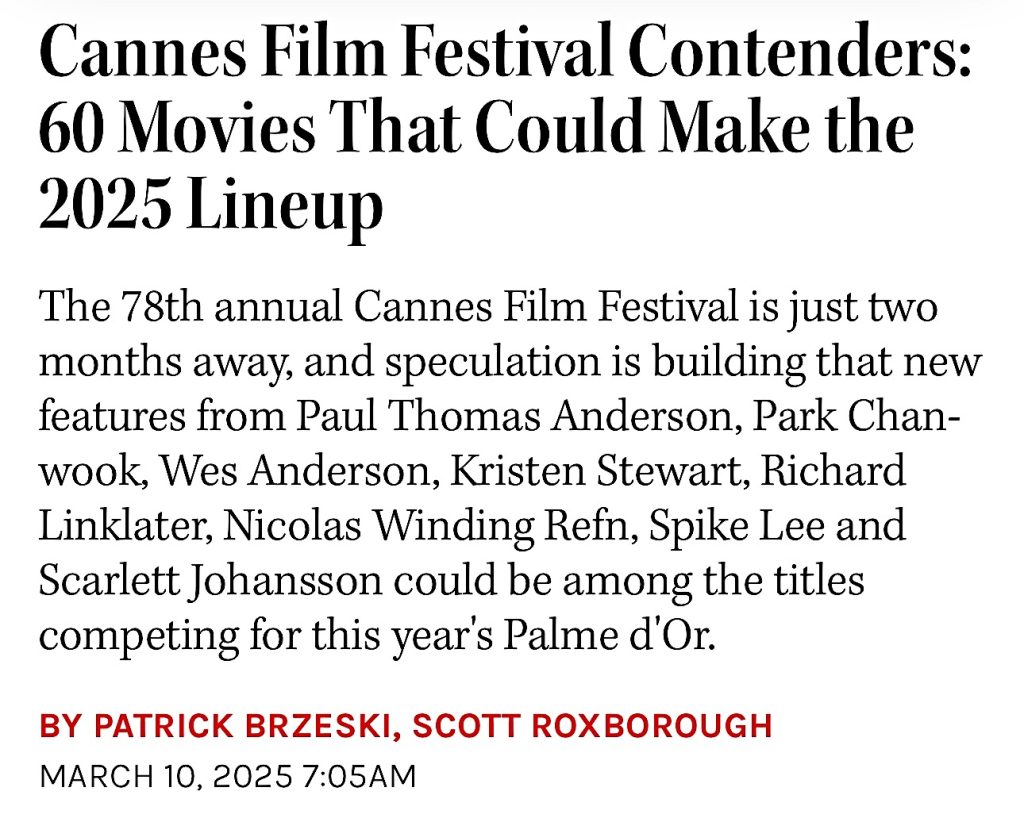

Knowing Maher’s Non-Adoring Views, Trump Is Ambivalent At Best About This Week’s Sitdown
Orange Mussolini has curiously acquiesced to Kid Rock’s idea of a White House dinner with Bill Maher this week, but he’s clearly uncomfortable with the fact that Maher isn’t a devotional boot–licker.
The meeting wouldn’t have been scheduled in the first place, of course, if Maher hadn’t earned a certain respect from righties for having routinely trashed woke lunatics over the last few years, and yet the authoritarian-in-chief still feels antsy…what a fragile child.
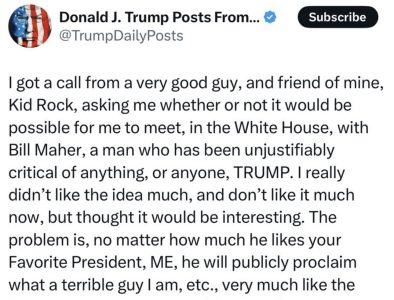
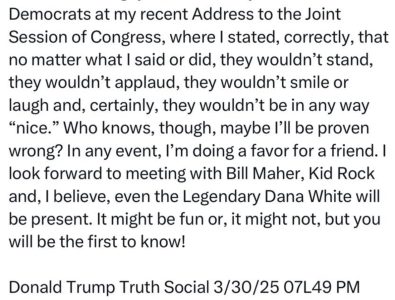
Shooting “Red River” in Monochrome Was A Bad Call
Nothing turns me on like luscious, highly detailed, well-rendered HD black-and-white films. I’ve loved watching them all my life and especially, since the aughts, in 1080p or 4K.
And by the same token, of course, I have no interest in watching crudely colorized monochrome knockoffs. No honorable cineaste tolerates them.
But — but! — if someone were to finesse an expert, top-of-the-line color transformation of Howard Hawks‘ Red River (’48) and issue it in 4K or at least 1080p, I would buy a copy tout suite.
I’m a fully contented owner of Criterion’s Red River Bluray, mind — it’s one of the handsomest monochrome westerns ever shot — but not capturing it in Technicolor was, I believe, a serious mistake on Hawks’ part.
Black-and-white was chosen for cost, I’m sure, but if there was ever a Hollywood example of penny-wise and dollar-foolish, Red River is it. Every frame of that film cries out for Technicolor hues.
Ditto in the matter of Hawks’ The Big Sky (‘52), another eye-filling outdoor adventure that was unfortunately shot in vivid monochrome. If you ask me the absence of color in this Kirk Douglas vehicle is a flat-out tragedy.
Which reminds me of the fact that you can’t even watch The Big Sky in 1080 or 4K — only in 480p standard def. It looks fairly awful. Which is kind of ridiculous in this day and age.
A Monoprix Performance in Paris
How many iPhones were shooting this as it happened? At least three. And the editing is pretty slick also. It’s all a staged performance by professionals, dammit! Nothing the least bit natural or spontaneous.
@raphaelfroissart 8 years old girl has a crazy voice @Violamarie @Charles Gaugué #hallelujah #singing #clarinet ♬ son original – Raphaël Froissart
Richard Chamberlain’s Theatrical Glory Decade
The long, lustrous and distinguished life of Richard Chamberlain ended yesterday at age 90, two days short of his 91st birthday.
If you’re an older couch potato, Chamberlain’s career began, peaked and gradually dwindled on television — the Dr. Kildare series (’61 to ’66), Shogun miniseries (’80), The Thorn Birds (’83). But between ’68 and ’77 — a full ten years — he did himself proud as a feature film actor (mostly in ensembles, twice in starring roles) in a few high-end films directed by grade-A auteurs.
The general obituary buzz, yes, has been that Dr. Kildare or the dashing Thorn Birds star has died, but some of us respect Chamberlain for better, deeper reasons.
Chamberlain’s greatest and richest big-screen role was in Peter Weir‘s The Last Wave (’77); his second best role was the anguished Peter Tchaikovsky in Ken Russell‘s The Music Lovers (’71). He was directed twice (technically thrice) by the great Richard Lester in 1968’s Petulia and then ’74’s The Three Musketeers and The Four Musketeers.
Chamberlain played one of the most despicable scumbags of all time in Irwin Allen and John Guillermin‘s The Towering Inferno (’74 — one of the biggest hits in the ’70s disaster wave), and four years later costarred in the most embarassingly awful disaster film of all time, The Swarm, which Allen produced and directed. (Michael Caine called it “a bee movie.”)
If you count Dr. Kildare and The Thorn Birds, Chamberlain was at the top of his fame=and-achievement game for over 20 years…he fully peaked throughout the ’60s, ’70s and early ’80s…longer than most big-name stars.
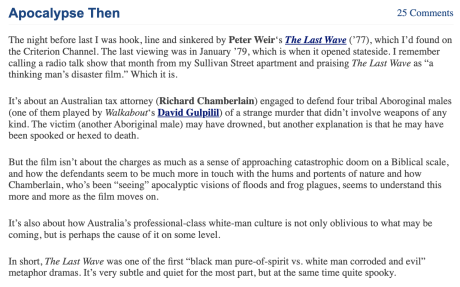
“Kind of a Nixon-to-China Thing…”:
Sometime this week Bill Maher will break bread in the White House with Orange Mussolini. The difference between this and Richard Nixon going to China in ’72 is that Mao Zedong and Chou en Lai, despite being Communist tyrants, were at least nominally sane, which is to say governed to some extent by rationality.
There are boilerplate dictators who have cold-bloodedly presided over mass murder, and there are emotional-infant tyrants like Trump and Kim Jong Un…different equation.
How will Maher pass along the detailed story of his dinner (McDonalds?) or some kind of sit-down with — I can’t believe I’m writing this — the first U.S. President since FDR to at least ponder the possibility of a third term in the White House, depending on how acquiescent the Dems and the courts may be to this possibility.
Sooner Rather Than Later
On top of which this may go to Cannes. If so, some are rooting for a Director’s Fortnight slot, which can be comfortably ignored.
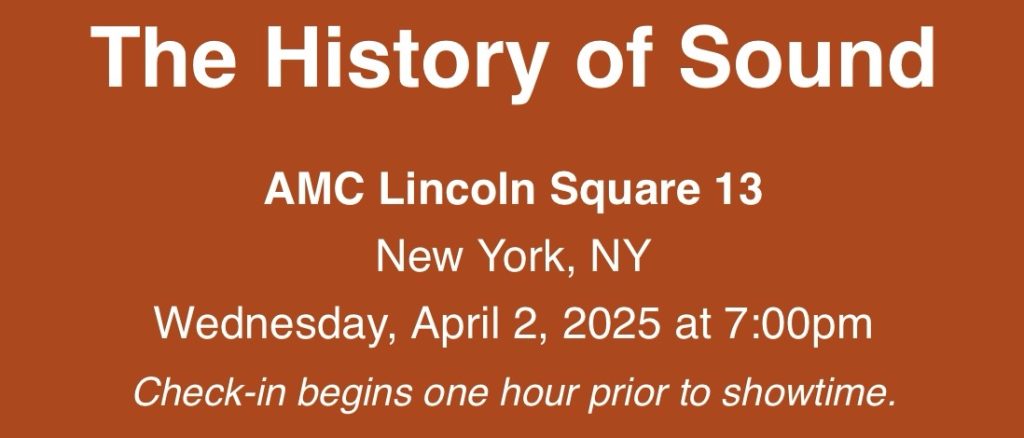
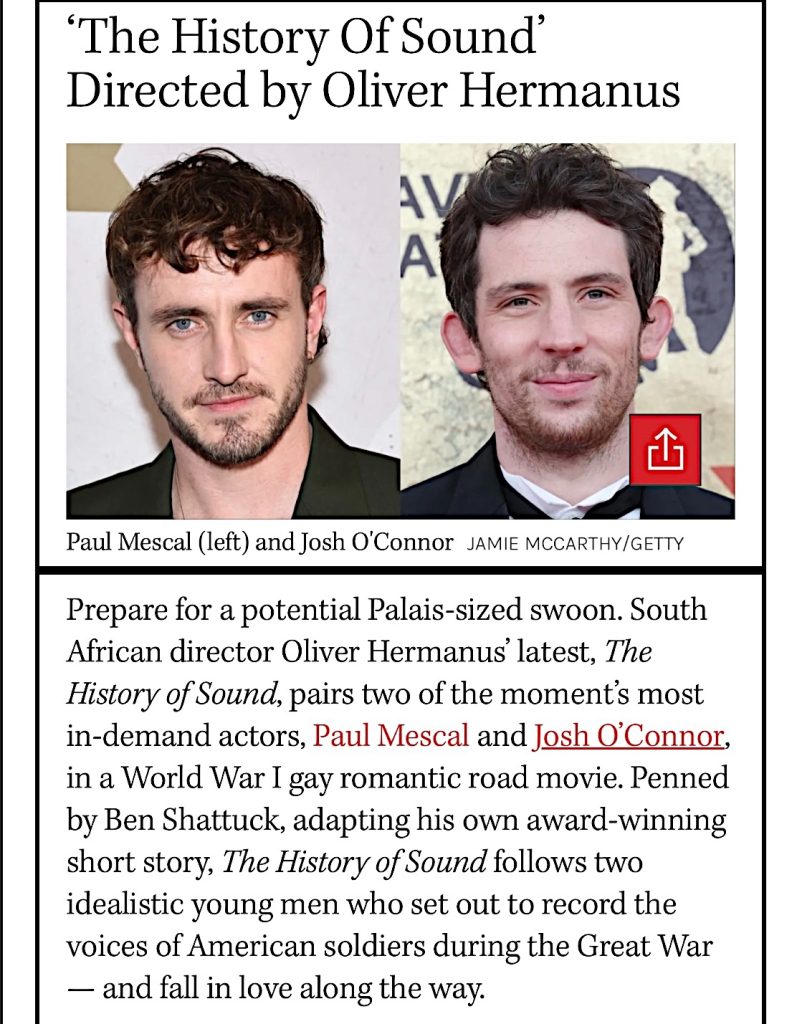
He Who Hesitates, Masturbates
I ran into Terrence Malick and a friend of his on the Cannes Croisette during…I can’t recall which festival but probably sometime around ‘12 or ‘13 or ‘14…somewhere in there. On the narrower, northern side of the boulevard as opposed to the southern beach side, not far from the Carlton.
I realized it was Malick right after we passed each other. The eponymous Panama hat, the shades, the salt-and-pepper beard. And so I paused and turned around and saw he’d done the same thing — stopped or slowed, half-turned, quizzically eyeballing me. Maybe he thought I was Chris Walken.
Candy-ass that I am, I didn’t seize the opportunity to approach and launch into a brief chat. I could have kept the ball in the air. I could’ve reminded him that I cold-called Mike Medavoy’s home in ‘95 because I’d heard he was staying there, and that he’d picked up and we’d bantered for three or four minutes.
Instead I wimped out. I just said “hey, Terry…how ya livin’?” and offered a casual salute and he returned the gesture, and I moved on. I wasn’t instantly seized by a feeling of self-loathing, but a hint of this had taken hold. It never left me.

